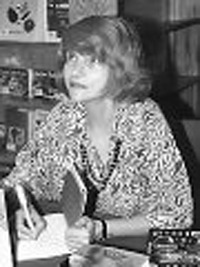Alison Lurie, lei è una scrittrice di successo e come studiosa ha esplorato campi diversi. Quando ha scoperto l’interesse per la letteratura per ragazzi e come si divide tra questa e quella per adulti?
Ho cominciato a leggere libri per ragazzi quando ero piccola e da allora non ho mai smesso; quindi mi sono sentita sufficientemente preparata per tenere per molti anni un corso su questa materia alla Cornell University. Ora passo circa un terzo o un quarto del mio tempo a leggere e a scrivere sui libri per ragazzi.
Una delle tesi del suo libro Bambini per sempre è che i migliori scrittori per bambini sono in qualche modo rimasti loro stessi bambini, o almeno che essi non riescono a identificarsi appieno con la realtà che li circonda. Questo può essere vero anche per chi passa la vita a studiare letteratura per l’infanzia?
Non credo che la maggior parte delle persone che scrivono sulla letteratura per l’infanzia siano ancora bambini nello stesso senso in cui lo sono gli autori, anche se spesso hanno avuto infanzie felici e apprezzano i libri per bambini e i giochi dei bambini.
Lei ha parlato dei bambini come di una strana tribù “semiselvaggia” e “poco studiata”. Qualche mese fa la rivista italiana L’Espresso ha ospitato una polemica tra uno scrittore e un attore sulla natura dei bambini. L’attore, Claudio Bisio, aveva scritto un monologo intitolato I bambini sono di sinistra alludendo alla libertà di giudizio che connota l’infanzia, alla sua apertura nei confronti dei diversi. Lo scrittore, Mauro Covacich aveva ribattuto che “i bambini sono di destra”, sono conservatori, tendono a difendere il loro terreno, sono pronti a vedere gli altri come nemici. Quale di questi punti di vista le sembra più sensato?
Credo che ci siano bambini conservatori e bambini democratici, proprio come ci sono adulti conservatori e adulti democratici.
In Bambini per sempre lei esprime dei giudizi su alcuni scrittori contemporanei. Mi piacerebbe conoscere la sua opinione su Lemony Snicket e la sua Serie di sfortunati eventi. I libri di Daniel Handler, alias Lemony Snicket, potrebbero rientrare nella sua definizione di letteratura sovversiva?
Questi libri mi sembrano un po’ ripetitivi, anche se l’idea di fondo è interessante. Mi pare che rispondano al crescente senso di pericolo che i bambini di oggi provano nei confronti del mondo esterno (dovuto soprattutto alle cronache giornalistiche su violenza e terrore) e inoltre mi pare che essi rassicurino sul fatto che, qualunque cosa succeda agli altri, i personaggi in cui il lettore si identifica riusciranno a salvarsi.
In Italia è molto raro che i libri per ragazzi vengano recensiti nei maggiori quotidiani (solo J.K. Rowling ottiene pagine intere). Secondo lei qual è il motivo per cui la letteratura per ragazzi è così sottovalutata?
La maggior parte dei critici e dei giornalisti una volta passata l’adolescenza non legge più i migliori libri per ragazzi. Quando si diventa adulti ci si dimentica quanto possano essere belli questi libri. Può anche essere che molti abbiano paura di essere giudicati “infantili”.
Interview to Alison Lurie
by Federica Velonà
Alison Lurie, you are a famous novelist (Foreign Affairs won the Pultizer Price) and you studied folklore as well as many other subjects. When did you discover the interest for children's literature and how do you divide yourself between children's literature and adult's literature?
I've read children's literature continually ever since I was a child, and was thus well prepared to teach a course in the subject at Cornell University for many years. I now probably spend from a third to a fourt of my time writing about and reading children's books.
One of the thesis of your book Boys and Girls for Ever, is that the best writers for children are still in some ways children themselves, or at least they have some problems to identify themselves with the reality they have to face. Can this also be true of people who spend their life studying children's literature?
I don't think that most people who write about children's literature are still children in the same sense that authors are, though they often had happy childhoods and enjoy children's books and children's games.
You spoke of children as a strange tribe. Some months ago in the Italian magazine L’Espresso there was a controversy between a writer and an actor. The actor, Claudio Bisio, had written a monologue entitled Children are leftist: it was about the children's freedom of thinking and so on. The writer, Mauro Covacich, answered with an article in which he claimed that children are "rightist", they are conservative, they consider the others enemies, they tend to defend their properties against the others . Which of this theory is more reliable for you? I believe that there are conservative children and liberal children, just as there are conservative and liberal adults.
In Boys and Girls Forever you spoke about some contemporary writers for children. I would like to know your opinion about Lemony Snicket and his Series of Unfortunate Events. It is possible to consider Daniel Handler (alias Lemony Snicket)'s books an example od subversive literature?
I find these books rather repetitive, though the underlying idea is interesting-- they seem to respond to the heightened sense of danger from the outer world that children have today (due perhaps mainly to the media reports of violence and terror), and also to provide reassurance that whatever might happen to others, the characters you identify with (and thus, you the reader) will escape.
In Italy it is not frequent to read children's books reviews on the most important newspapers (only J.K.Rowiling gets full pages). What is, in your opinion, the reason why, children's literature is in general so underestimated? Most editors and reviewers don't read the best children's books after they are teenagers, so by the time they become adults they have forgotten how good these books can be. Also, they may be afraid of being thought 'childish'.


